- Home
- Jim C. Hines
Revisionary Page 3
Revisionary Read online
Page 3
“Best not mention that to the committee,” said Vaughn. “Last I checked, the Porters weren’t exactly innocent in this whole mess. Look at all those casualties from your battle in Copper River. What about the victims of rogue weres and vamps and all the rest? Like that fellow you told me about, the one in the U.P. who fed on Boy Scouts?”
“He hasn’t touched a child since the day I put a bomb in his skull. I’m not saying we ignore killers, but—”
“Did you hear what you just said, Isaac?” Derek let out a long, slow breath that smelled faintly of pipe smoke. “You put a bomb in that fellow’s head. You Porters were judges and executioners, and people know it. Fact is, you are dangerous.”
“Of course we’re dangerous. So are you. So is every paranoid, trigger-happy idiot ordering vampire-hunting kits off e-Bay or melting antique candlesticks to make silver bullets. You know what’s more dangerous? Entire nations doing the same damn thing.” I raised a hand before he could argue. “You’re right, the Porters screwed up sometimes. I screwed up. I also saved a lot of lives, and we could save a hell of a lot more if people would just let us. There are kids dying out there, Derek. People who need our help. We can’t fix everything, but we can do so much better than we are right now, and all anyone wants to do is talk about preemptive magical strikes and how many people they can kill with the next libriomantic superweapon.”
“What do you suggest?” he asked. “Should we abandon national defense, let you run off to produce your magical rainbows and unicorns, and wait for some genie from the Middle East to wish the American people into turnips?”
“That’s not how genies work, you ignorant—”
“Isaac.” Nidhi spoke quietly, making me realize how loud I was getting.
I sat back, pulled off my glasses, and rubbed my eyes. “I’m sorry. I know you’re trying to navigate this mess the best you can, but it’s not enough.”
“You think I don’t know that? You get to go home to Vegas to play in your lab. I have to jump back into that snake pit every day.” He sounded as tired as I felt. “How’s Lex doing?”
Vaughn had an excellent memory for people, and never failed to ask about my niece. “She’s excited. Nervous, too, but mostly impatient to be done. I’ll be flying back to Vegas later tonight so I can be there for her procedure.”
“We need more success stories like hers,” said Vaughn. “Show the world how magic restored a little girl’s leg.”
“We could have showed the world a year ago,” I pointed out.
“Isaac, you know this has to be done by the book. If there’s the slightest possibility of things going wrong, you could do more harm than good.”
“Tell that to Lex and her parents.”
Before he could answer, Nicola’s cellphone buzzed on the table, playing the opening bars of a Harry Connick Jr. song.
“Excuse me.” She picked up the phone and turned away.
Vaughn’s phone went off a moment later. My hands clenched. I hoped it was coincidence, but I wasn’t surprised when my own communicator chimed to signal an incoming call.
“This is Isaac. What happened?”
“It’s Talulah. New Millennium is on lockdown. Have you seen the news?”
“Not yet.” I looked around the table. Nicola was a statue, sitting with deliberate stillness as she listened. Vaughn’s face had gone red, and he was swearing under his breath.
“They’re reporting multiple attacks by inhuman terrorists.”
“How many, and where?” I asked.
“At least four.” Talulah hesitated. “Including one in Lansing. Michigan’s governor is in critical condition. Similar attacks were launched simultaneously in California, Oklahoma, and New York.”
I felt like I’d swallowed a twenty-ounce bottle of battery acid. I stood and grabbed Smudge’s cage, clipping it to my belt with an aluminum carabineer.
Nicola covered her phone. “Go. Help the wounded, and assist the police.”
“Isaac,” said Vaughn. “Make yourself visible.”
I grimaced. In other words, play nice for the cameras and put on a good public relations face for the Porters. I hated this part of my job, but he was right. Especially if these attacks had been carried out by nonhumans.
“How long will it take you to get to Michigan?” asked Nicola.
“Five minutes.” I donned my jacket and hurried toward the door, Lena and Nidhi close behind.
No matter how quickly we arrived, no matter how much we helped, part of me was starting to believe it would never be enough.
From: [email protected]
To: [email protected]
Subject: Catalog Reservations
Hello Isaac,
This is an automated reminder from the Porter Databots.
We noticed you have an unusually large number of titles reserved in the Porter catalog. While we appreciate your diligence in helping to minimize overuse and magical charring, we wonder if maybe you’ve forgotten to release some of those 184 books back into circulation for use by other Porter researchers and field agents.
The ten books that have been reserved the longest are listed below. Please log into the Porter catalog to see the full list and release any books you’re no longer using.
If you have a legitimate ongoing need for these books, please contact Porter librarian Zsuzsanna Varga.
Thanks!
Titles Checked out by Isaac Vainio, User #M3714:
1. Lewis, C. S. The Lion, The Witch, and the Wardrobe.
2. L’Engle, Madeline. A Wrinkle in Time.
3. Pierce, Tamora. In the Hand of the Goddess.
4. Carroll, Lewis. Through the Looking Glass.
5. Goodkind, Terry. Debt of Bones.
6. Gabaldon, Diana. Outlander.
7. Homer. The Odyssey.
8. Gaiman, Neil. Neverwhere.
9. Donaldson, Stephen. The Mirror of Her Dreams.
10. Valente, Catherynne. Palimpsest.
Click here to log into our catalog and review the full list
“I thought you’d made plans for all this.”
“There have always been contingency plans for the revelation of magic, as well as for my own death.”
“What happened? Did you forget to share those plans with anyone else?”
“To paraphrase Von Moltke, no plan survives beyond the first encounter with the enemy. I left the Porters with certain goals and strategies. Proper disposal of my body, for one. Delegation of power to a small group, no more than six. The importance of international neutrality. The safety and security of our own people. Most importantly, a focus on the long term that should help us all survive the short-term chaos and upheaval.”
“Define ‘short-term.’”
“Historically speaking? Years. Decades, most likely.”
“How many people are going to lose their lives as a result of that chaos?”
“As you’ve said, magic can’t predict the future.”
“It can damn well guess.”
“By my estimate, given human nature? Millions.”
THE SERVICE THE PORTERS WERE USING for transportation and security in D.C. wasn’t scheduled to pick us up for at least another hour, so Lena hailed us a cab while I took a copy of Neil Gaiman’s Neverwhere from my jacket.
“Where to?” asked the driver, an older woman in a yellow headscarf with the gruff voice of a longtime smoker.
I scooted into the back and handed her a ten. “Just keep it parked here for a minute, eh?”
“You waiting for someone?”
“Not exactly.”
Lena sat down beside me. “Shortcut?”
“I hope so.” Neverwhere was one of the books I’d been rereading as part of my own research. I might not be able to create a stable portal from Vegas to the U.P. yet, but I was getting closer, and I’d learned a few tricks in the process.
I’d also accidentally sent a pair of lab rats to either Alpha Centauri or possibly a wardrobe in London. I doubted Vince would
ever forgive me for that one.
I turned to a page marked with a blue Post-it note. I could recite the scene from memory, but it was simpler to touch the book directly, to reread and submerge myself in the story. Every page had its own texture, as unique as a fingerprint. I could feel the individual letters and the ink pressed into the paper, like a blind man reading embossed print in the days before Braille.
Gaiman had created a character named Door. I’d experimented with her magic back at the lab. This would be my first time using it in the field.
My fingertips sank through the paper, touching the world so many of Gaiman’s readers had visualized and dreamed about. While that world was fictional, the belief and imagination of his readers was quite real. That was where the story’s true magic came from, with the physical book serving as a magnet and anchor for that cumulative belief.
The driver twisted around. “What are you doing back there?”
“We’ll be on our way in a moment,” said Nidhi.
Libriomancy in its most common form allowed us to grasp an object from a story and pull it into the world, transforming belief and potential magical energy into physical reality. Assuming said object would fit through the pages.
If that was 101-level libriomancy, what I’d been working on for the past year was post-graduate work.
My vision blurred, like I’d been reading too long in poor light. My mother used to tell me I’d ruin my eyes that way. As it turned out, she hadn’t been entirely wrong.
I yanked off my glasses and slipped them into my shirt pocket. The spots of shadow floating around the edges of my vision grew worse, but the book’s text sharpened. The damage to my eyes was a result of magical charring, and behaved similarly to early cataracts. Glasses helped me to compensate, but paradoxically made it harder for me to truly see magic.
I’d tried to heal the damage, but the scars weren’t physical. Magic simply flowed around the charring, like a stream past rocks.
I reached deeper into the book. My hand touched Door’s back. Rather, the composite imagination of Door’s back. I wasn’t truly touching the outline of her shoulder blades, or feeling the faint beating of her heart. I was touching readers’ belief. Belief in the character, and belief in her particular ability.
“Our driver’s getting twitchy,” Lena commented.
“I’m almost done.” From here, I could have plucked an object from Door’s hand and created it in my own. Instead of pulling anything physical from the page, I grasped Door’s ability and drew it into my body. Lines of text crept up my skin. In essence, I was making myself an extension of the book.
This kind of libriomancy carried two significant risks. For one thing, the magic came from a fictional universe. Any portal I created would want to connect to that nonexistent universe. If I screwed up, we’d be lucky to find ourselves lost in the sewers of London. If we were unlucky, the magic would try to send us into Gaiman’s fictionalized London.
Since that world didn’t exist, it would just kill us instead.
Then there was the danger of letting a book get into your head. As the story flowed through my blood, I began to hear the characters calling me. When I looked around, it was as though the fictional world had been overlaid with this one. I saw our driver staring at my truncated arm, watched her mouth move, but I heard the murmurs of the London crowd, saw tunnels and subway lines passing through the cab, smelled the damp fog . . .
“Isaac?” Lena touched my neck, helping ground me in the real world.
I placed my other hand on the inside of the cab’s door and pushed the story through me, into the metal and plastic of the car. The words were like a windstorm trying to escape, trying to create a gateway back to their book.
I forced them instead to a place I knew well enough to anchor my thoughts against the fragments of Neverwhere swirling around me like a maelstrom. “It’s like herding cats across a river.”
“I can call Nicola if you need help,” said Nidhi.
“No, I’ve got it. Probably.” I pushed the last of the text into place and opened the door. When I climbed out, I emerged from the back of a pizza delivery car parked on the side of a very different road.
Had Gutenberg been alive, I’m sure he would have cast this spell without a second thought, putting us down on the front steps of the capitol building. Given another five hundred years of practice, I liked to think I’d have done the same.
“What the hell are you doing?” The shout came from a young woman across the road, carrying an empty red delivery bag. “Get out of my car!”
“Sorry!” I stumbled away from the car, shoved Neverwhere into my jacket pocket, and checked on Smudge. He didn’t look happy, but he wasn’t about to set anything on fire either, which meant the driver probably wasn’t going to pull a gun and shoot me just yet. I glanced around. I’d put us down in East Lansing, on the campus of Michigan State University. “Technically, we weren’t in your car. We just—”
“What do you mean ‘we’?” She hurried across the road and pushed past me to check the back seat, which was empty. She tossed the delivery bag into the back, aimed her cellphone at my face, and snapped a picture before dialing what I assumed was the police. “What did you take, asshole?”
“Nothing,” said Lena as she emerged from the car.
The poor woman jumped so hard she dropped her phone. Lena caught it before it hit the pavement.
I flexed my hand. The fingertips were a bit numb, but I saw no sign of charring. I checked the magnetic sign on the top of the car. “Georgio’s, eh? I used to eat there all the time when I was an undergrad.” I pulled out my wallet and handed her a twenty. “I’m sorry we scared you. Consider this part of your tip for the night?”
She stared at me, then at the car, where Nidhi now appeared to be climbing out of nothingness. “That’s . . . that’s magic.”
“Pretty cool, isn’t it? If I had more time, I’d tell you how it worked.”
“He would,” Lena said. “Even if you asked him to stop.”
I pointed to the three-story brick building across the street. “That’s Mason-Abbot Hall, which puts us on the northeast corner of campus, about ten miles from Lansing.” I turned back to the delivery driver. “How’d you like to make a bigger tip?”
“If traffic doesn’t pick up soon, I’m going to fly the rest of the way,” I muttered.
“You can do that?” Our impromptu driver’s name was Callie, a second-year communications major who had agreed to drive us into Lansing only after getting a selfie with Lena, and another with Smudge.
“I can. The FAA gets cranky about it, though.”
Callie swerved into another lane, then slammed the brakes. “Shit. Sorry. I knew they’d closed 496, but it looks like they’ve blocked off Saginaw, too. I’ll get you as close as I can. Is it true this was a terrorist attack?”
“We don’t know yet,” said Nidhi.
Lena was studying her hands. “I should get rid of these,” she said, touching the buds on her knuckles. “It’s probably safer for everyone if I pass for human.”
I wanted to argue, to tell her to be herself. I looked at Nidhi and saw the same conflict in her eyes. If the attackers weren’t human, advertising Lena’s nature could make her the target of angry crowds or overzealous law enforcement. Neither of us spoke as the green buds slowly absorbed back into Lena’s skin.
Callie broke the silence. “There was a campus march for Marcus Visser last week. A real werewolf came to speak. It was pretty intense. The cops showed up at the end. Six people got pepper sprayed.” She turned north and snuck a block closer before hitting another line of stalled traffic. “I think this is as close as I can get you.”
“It’s close enough.” I handed her another forty bucks and climbed out of the car. I could see the capitol dome a short distance away, past bumper-to-bumper traffic. “Thank you.”
She rolled down her window. “Hey, that libriomancy stuff. Can anyone learn it? I was thinking of changing majors.”
> “Sorry. It doesn’t work that way.”
The noise hit hard: horns blaring uselessly in the streets, sirens wailing, shouts and chants in the distance. I heard dogs barking as well, but I couldn’t tell if they were pets howling at the noise or police dogs trying to track the perpetrators.
Then there were the people making their way toward the capitol. Many had similar expressions of shock, confusion, and grief. Others had skipped past grief to rage. Even if I hadn’t known where I was going, the flow would have carried us to the site of the attack.
A uniformed police officer stood in the intersection up ahead, diverting traffic. Another officer on horseback trotted up the opposite side of the road. Two helicopters circled overhead. From what I could see, one was a news chopper, while its louder big brother looked military.
Lena took the lead, being the best equipped to deal with physical confrontations. Nidhi and I followed close behind, letting Lena serve as our icebreaker. I split my attention between Smudge and the crowd, watching for potential magical threats. Smudge seemed more interested in the bugs swarming about the street lamps.
Yellow barricades blocked the streets at Ottawa and Capitol. Beyond those barriers, ambulances and police cars lined the roads. The news vans had parked farther off. It looked like every camera crew in the state was pressed up against the yellow tape surrounding the capitol building, along with reporters from some of the national outlets.
The tension after the hearing in D.C. had been bad, but at least that had been in daylight, with a short, clear path to our escape.
The emotion here was colder and less stable. Officers in riot gear were doing their best to keep things under control. I found myself holding my breath, like I was afraid of setting off an explosion. Sweat trickled and tickled down my back.
All reporters were being kept back with the rest of the crowd. Some called out to officers and detectives for statements, while others interviewed random bystanders. I eavesdropped long enough to overhear one reporter say something about werewolves and an unknown number of casualties. I turned up the collar of my duster and approached the nearest uniformed officer, keeping my hands in full view.

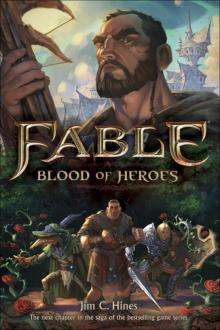 Fable- Blood of Heroes
Fable- Blood of Heroes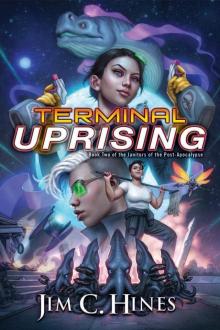 Terminal Uprising
Terminal Uprising The Stepsister Scheme
The Stepsister Scheme Unbound
Unbound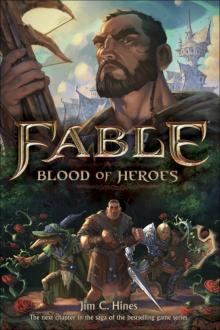 Fable: Blood of Heroes
Fable: Blood of Heroes Codex Born
Codex Born The Snow Queen's shadow pn-4
The Snow Queen's shadow pn-4 The Snow Queen's Shadow (v5) (epub)
The Snow Queen's Shadow (v5) (epub)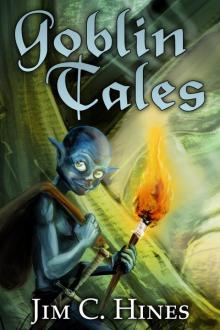 Goblin Tales
Goblin Tales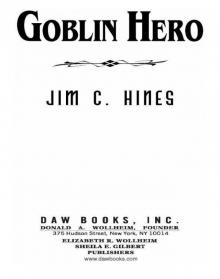 Goblin Hero
Goblin Hero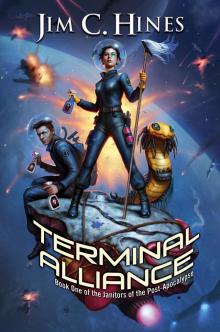 Terminal Alliance
Terminal Alliance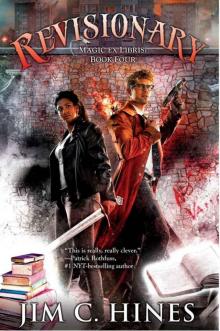 Revisionary
Revisionary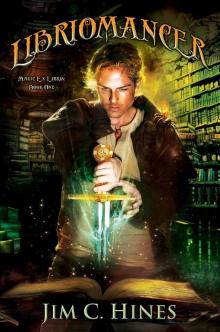 Libriomancer: (Magic Ex Libris Book 1)
Libriomancer: (Magic Ex Libris Book 1) Red Hood's Revenge
Red Hood's Revenge Codex Born mel-2
Codex Born mel-2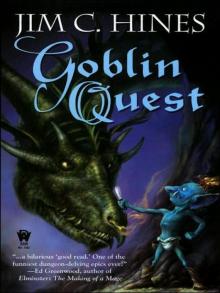 Goblin Quest
Goblin Quest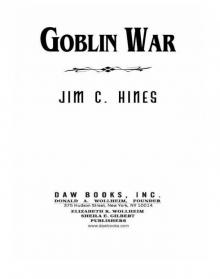 Goblin War
Goblin War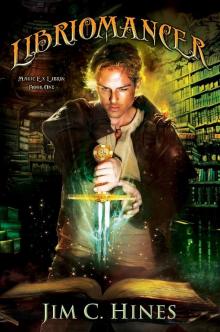 Libriomancer mel-1
Libriomancer mel-1